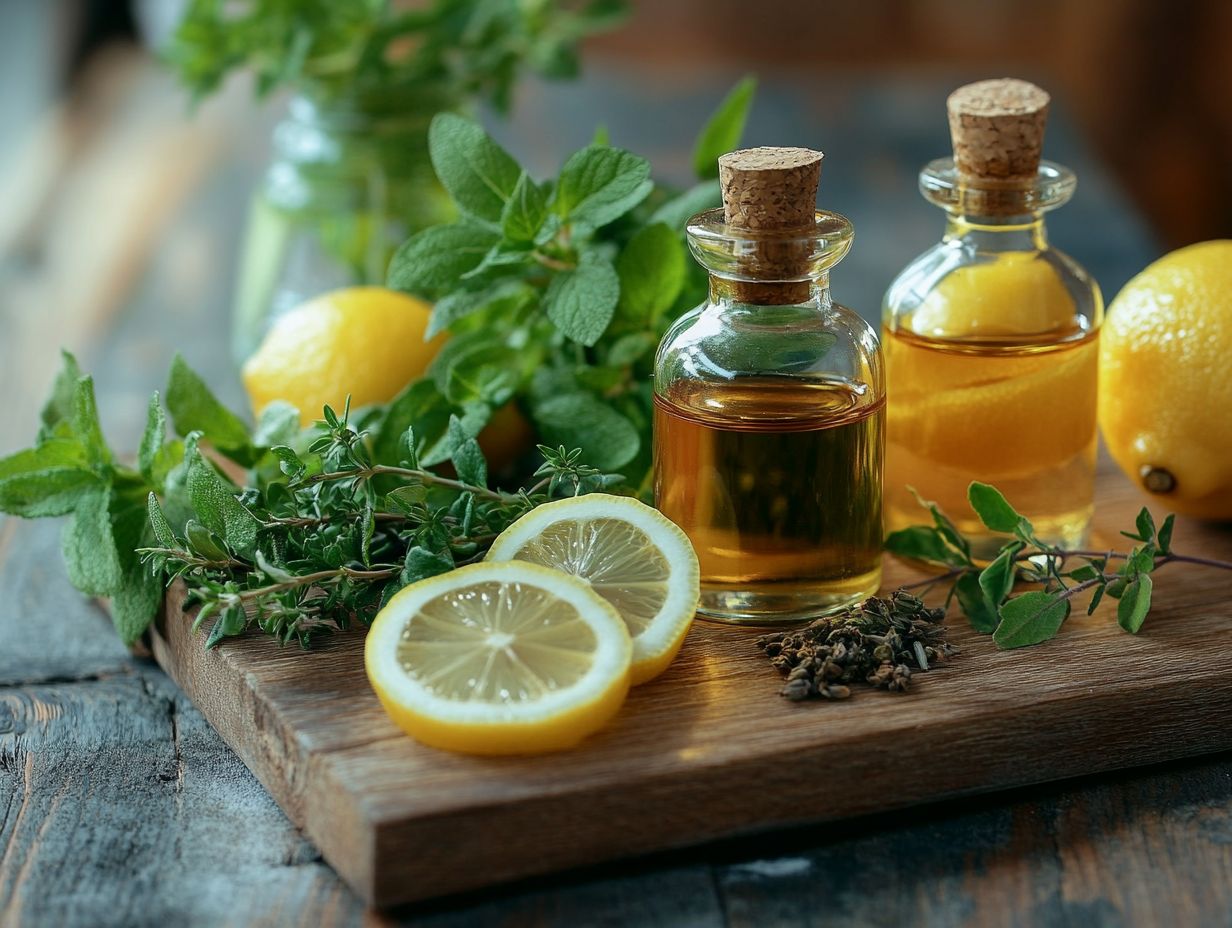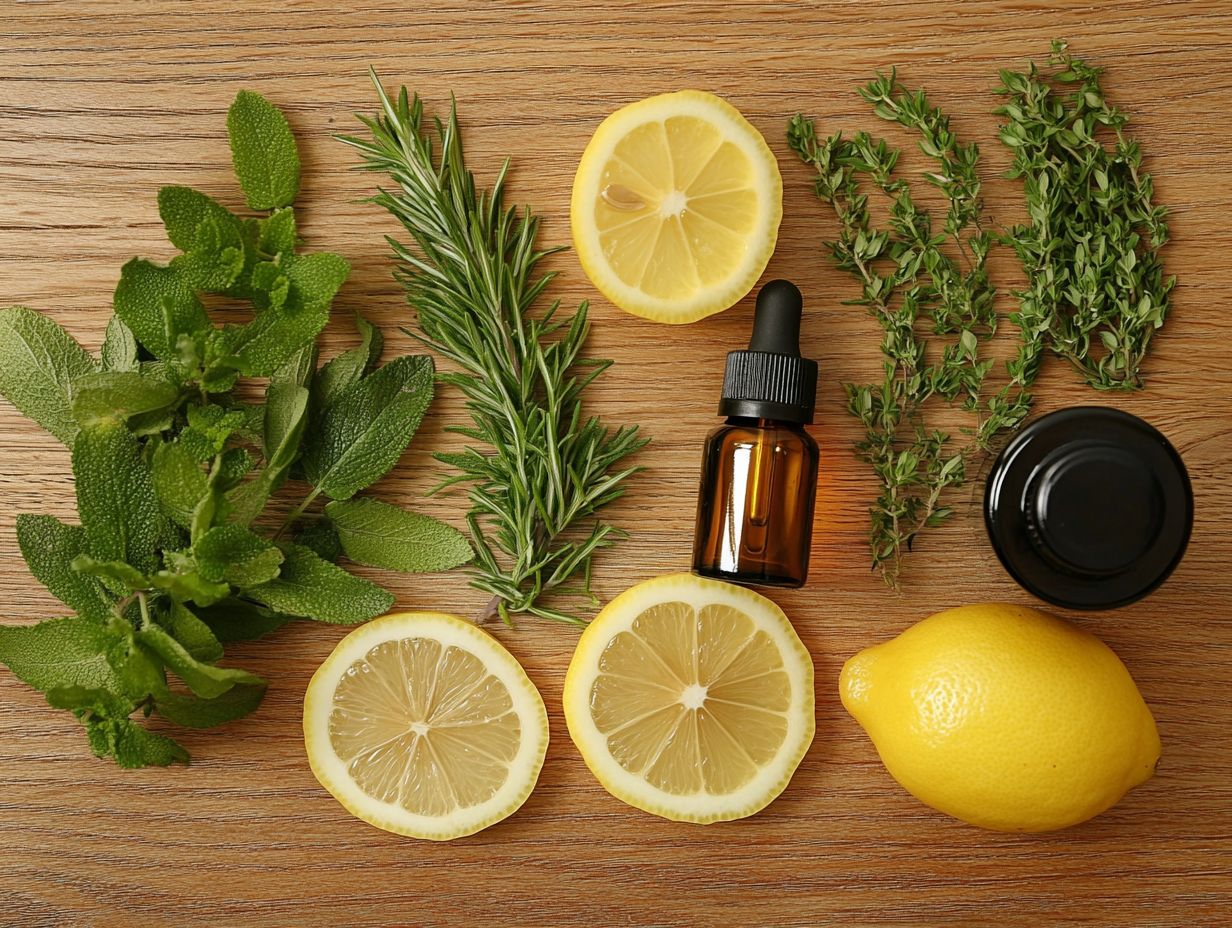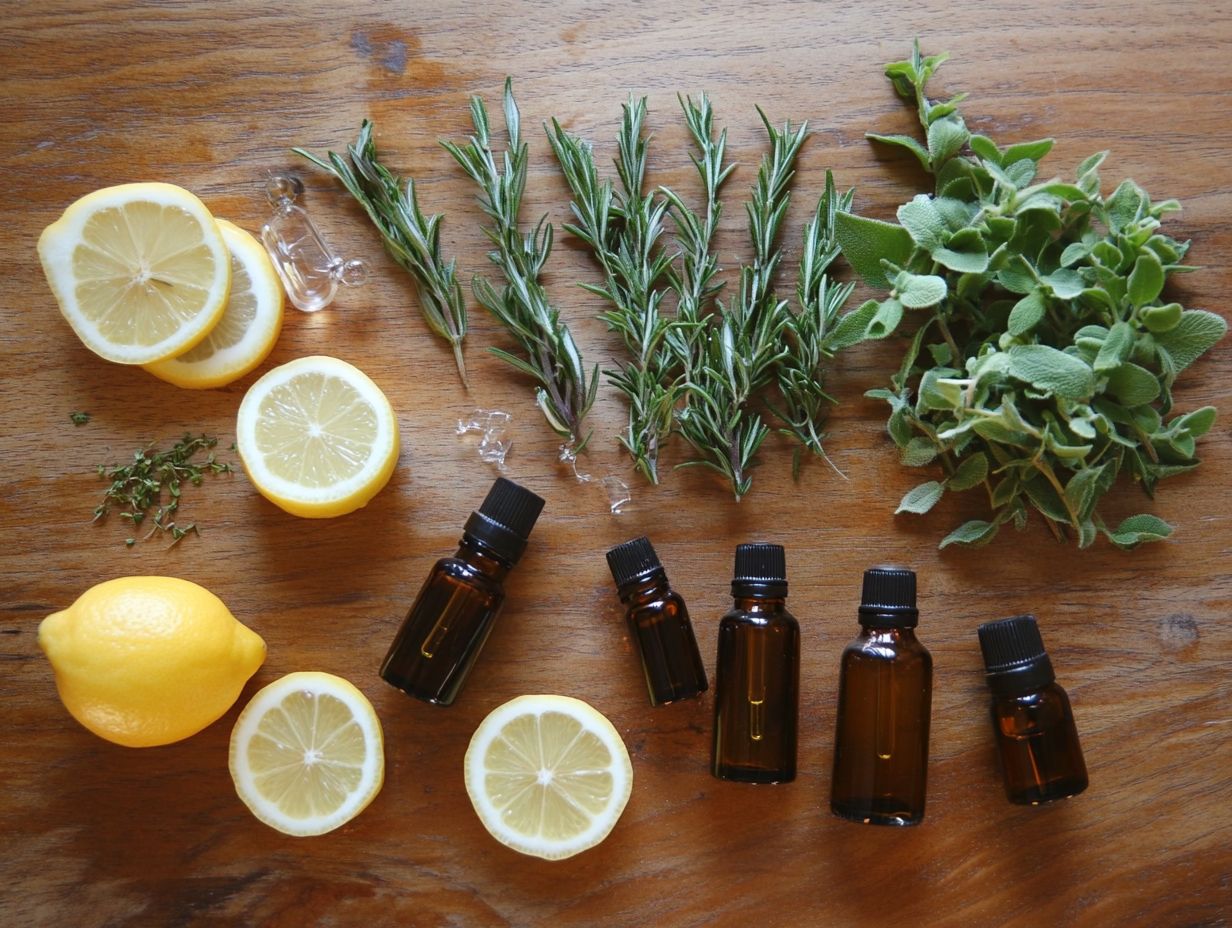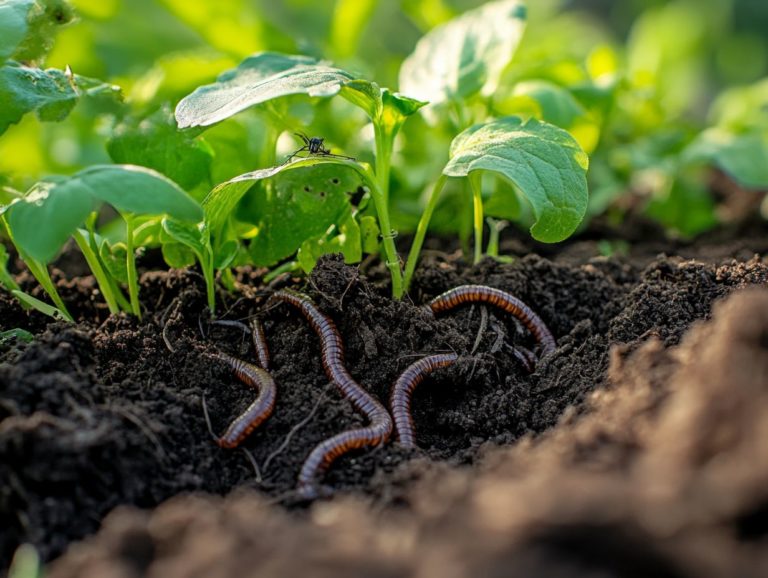How to Use Essential Oils for Pest Control
Essential oils do more than just add fragrance to your home. They serve as natural remedies for pest control.
From ants to roaches, these strong plant oils can effectively fend off a wide range of household pests. Let s explore the best essential oils for keeping pests away and offer practical methods for their safe application.
Discover the advantages of choosing these non-toxic alternatives and get tips for maintaining a pest-free environment in your home. Act now to keep your home pest-free with these simple solutions!
Contents
- Key Takeaways:
- Common Household Pests and Essential Oils for Control
- How to Use Essential Oils for Pest Control
- Benefits of Using Essential Oils for Pest Control
- Tips for Using Essential Oils for Long-Term Pest Control
- Maintaining a Pest-Free Environment
- Frequently Asked Questions
- 1. What are essential oils and how can they be used for pest control?
- 2. Which essential oils are most effective for pest control?
- 3. How do I use essential oils for pest control?
- 4. Are essential oils safe to use for pest control?
- 5. Can essential oils be used to repel all types of pests?
- 6. How often should I use essential oils for pest control?
Key Takeaways:

- Essential oils are natural and non-toxic alternatives to chemicals for pest control.
- Effective oils include peppermint, lemon, and tea tree oil.
- To keep pests away, use oils regularly with diffusers or sprays and maintain cleanliness.
What are Essential Oils and How do They Work?
Essential oils are concentrated extracts derived from a variety of plants, flowers, and herbs, each known for its aromatic and therapeutic properties. These oils come from methods like steam distillation or cold pressing and contain unique compounds that offer a multitude of benefits from relaxation and mood enhancement to natural pest protection, including insect repellent properties.
The rising popularity of essential oils in daily life underscores their potential for a balanced approach to health, particularly as non-toxic alternatives to chemical treatments. By understanding how these oils work, you can confidently harness their benefits in a safe and effective manner.
These natural compounds, such as terpenes and phenols, work with your body s natural processes to improve health and promote balance. For example, lavender essential oil is celebrated for its calming effects, while tea tree oil has antibacterial qualities that can guard against harmful microbes and is beneficial for pest management.
Essential oils can effectively deter pests without the adverse side effects associated with synthetic repellents.
By diving into the diverse uses and health benefits of specific essential oils, you can seamlessly integrate these remarkable extracts into your lifestyle, enhancing both your emotional well-being and physical health.
Common Household Pests and Essential Oils for Control
Common household pests like mosquitoes, ants, roaches, and fleas can seriously disrupt your comfort and health, prompting many homeowners to pursue effective pest management solutions.
Recently, the use of essential oils has gained traction as a natural method for pest control, providing an eco-friendly alternative to traditional insecticides. Oils such as peppermint, lavender, and eucalyptus have proven effective in deterring various pests, making them invaluable allies in your battle against infestations.
By understanding which oils are most effective for specific pests, you can significantly elevate your pest prevention efforts.
Effective Oils for Ants, Roaches, and Other Pests
Certain essential oils have emerged as powerful natural insect repellents for common nuisances like ants and roaches.
These oils not only serve as a safer alternative to chemical pesticides, but they also infuse your home with delightful fragrances. To create an effective repellent blend, consider mixing peppermint oil with a few drops of eucalyptus and lavender. This combination drives away pests and elevates the ambiance of your space.
For outdoor settings, a mixture of thyme oil and citronella oil can work wonders, forming a protective barrier against pesky mosquitoes and gnats, while complementing your bug repellents approach.
By experimenting with various combinations, you can customize your essential oil blends for targeted effectiveness against specific pests, enhancing both your comfort and protection in your living environment.
How to Use Essential Oils for Pest Control

Using essential oils for pest control provides straightforward methods that fit easily into your household routine. You can create effective essential oil mixtures for sprays, diffusers, or blend them with carrier oils, like rosemary oil, to enhance their effectiveness.
For instance, a diluted concoction of peppermint and eucalyptus oils works as a highly effective and safe indoor bug spray. By learning the right application techniques and proportions, you can use these natural remedies to protect your home from unwanted intruders.
Methods of Application and Safety Considerations
When using essential oils for pest control, it’s important to apply them correctly and prioritize your health safety.
Properly diluting essential oils with carrier oils is essential to avoid any adverse reactions while ensuring their pest-repelling properties work effectively.
Integrating these oils into your home care routine can be rewarding, but it s crucial to understand the importance of correct application methods. For example, using a diffuser or a spray bottle with a measured blend not only boosts effectiveness but also creates a safer environment. Be mindful of the specific oils you choose, as some may trigger allergies or sensitivities, especially in children and pets. Thus, safe pest control practices are vital.
Regular monitoring for any reactions or signs of distress can help you catch potential issues before they escalate. By following these safe practices, you can confidently harness the natural power of essential oils.
Benefits of Using Essential Oils for Pest Control
The benefits of using essential oils for pest control extend beyond simply repelling insects; they offer a natural and non-toxic alternative to standard chemical treatments.
Unlike traditional insecticides, essential oils are safer for you and your pets, making them a better option for pest elimination.
These oils also support a more sustainable approach to pest management, significantly reducing the environmental impact associated with harsh chemicals. By incorporating essential oils into your pest control strategies, you can achieve effective results while promoting health safety and ecological balance through green pest control methods.
Natural and Non-Toxic Alternative to Chemicals
Essential oils are becoming recognized as a natural and non-toxic alternative to chemical treatments in pest control. They provide effective solutions without the health risks commonly linked to standard methods and insecticides.
By leveraging nature’s capabilities, you can explore various essential oils known for their pest-repelling properties, such as patchouli oil and citronella oil.
For example, peppermint oil not only deters common household insects but also fills your living spaces with a refreshing scent. Citrus oils, like lemon and orange, are valuable allies in your battle against ants and other pests, all while uplifting your mood with their vibrant aromas.
By incorporating these natural remedies into your pest control routine, you ensure safety for your children and pets while fostering a healthier home environment. This showcases the remarkable benefits of choosing eco-friendly alternatives.
Tips for Using Essential Oils for Long-Term Pest Control

Implementing essential oils for long-term pest control requires a proactive approach that emphasizes regular maintenance and preventive measures. This helps keep those pesky household invaders at bay.
Establish a consistent schedule for applying essential oil mixtures and monitoring areas prone to insect infestations.
For example, regularly using lavender and peppermint oils not only acts as an effective insect repellent but also fills your home with a delightful aroma. This minimizes the chances of re-infestation. By weaving these practices into your routine, you can successfully create a pest-free sanctuary.
Start using essential oils today and enjoy a pest-free home!
Maintaining a Pest-Free Environment
Maintaining a pest-free environment is crucial for your household’s comfort and safety. Essential oils can significantly contribute to this endeavor. By incorporating regular pest management practices that utilize essential oils, you can establish a natural barrier against common pests.
For instance, using essential oil mixtures in diffusers not only keeps insects at bay but also enhances your indoor atmosphere. Establishing routines for applying these oils, along with practicing cleanliness and preventive measures, can greatly bolster your efforts in bug prevention.
Routine cleaning does more than just eliminate food sources and hiding spots for pests; it also amplifies the effectiveness of these natural remedies. Regularly decluttering your spaces, sealing cracks, and ensuring proper waste disposal are vital strategies in this ongoing battle. Using essential oils like peppermint or tea tree oil, celebrated for their repellent properties, can further enhance your defense against unwanted guests.
Consider creating DIY pest sprays by blending essential oils with water and vinegar to treat specific areas effectively. This ensures a natural pest protection strategy.
This holistic approach creates a healthier, happier home for you and your family!
Frequently Asked Questions
1. What are essential oils and how can they be used for pest control?
Essential oils are concentrated plant extracts known for their potent aroma and natural properties. You can use them as a natural alternative to chemical pesticides for pest control, offering natural pest protection against various household pests.
2. Which essential oils are most effective for pest control?

Some of the most effective essential oils for pest control include peppermint oil, lavender oil, tea tree oil, eucalyptus oil, and citronella oil. These oils have strong scents that repel insects and pests, making them effective insect repellents.
3. How do I use essential oils for pest control?
You can use essential oils in a variety of ways for pest control. Create a bug spray by mixing them with a carrier oil or water in a spray bottle. You can also use them in diffusers or apply them directly for effective pest management.
4. Are essential oils safe to use for pest control?
Yes, essential oils are generally safe for pest control, as they are natural and non-toxic. This reduces health risks compared to traditional chemical treatments. However, always dilute them properly to avoid potential health safety issues, and use caution around children or pets.
5. Can essential oils be used to repel all types of pests?
Essential oils can effectively repel many pests, but they may not work for all types. Some pests may be more resistant to certain oils, so using a combination of essential oil blends or alternative pest control methods may be necessary for complete eradication, including bug prevention.
6. How often should I use essential oils for pest control?
The frequency of using essential oils for pest control depends on the severity of the insect infestation. It is best to use them regularly until the pest issues are resolved, as many oils like thyme oil and rosemary oil can be beneficial.
Don t wait! Protect your home from pests now with these essential oils!






